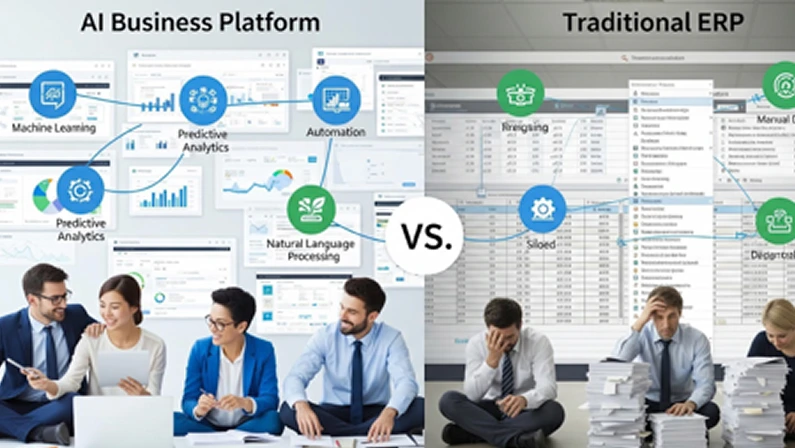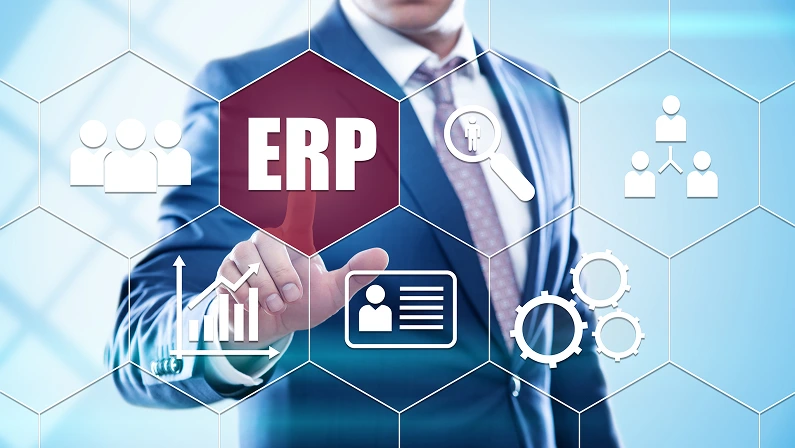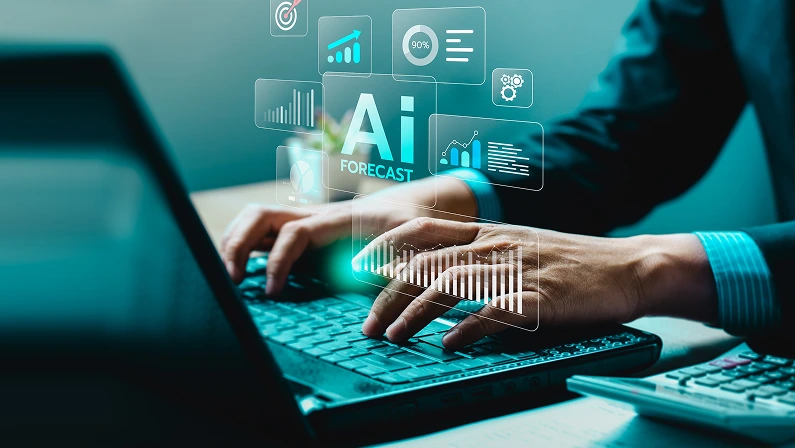
Running a small or mid-sized business in 2025 means making smart choices about technology. The tools you pick shape how quickly you can grow, how well your team works together, and how effectively you serve your customers. For many business leaders, the decision boils down to one big question: AI Business Platform vs. Traditional ERP—which is the better fit?
Both options promise order, structure, and performance, but they take different routes to get there. Traditional ERP (enterprise resource planning software) has been around for decades, standardizing workflows and consolidating processes. An AI business platform, on the other hand, brings in automation, predictive insights, and flexibility.
So which one is the smarter fit for your SMB? Let’s break it down.
What Is a Traditional ERP System?

Enterprise resource planning software, or ERP, has been the backbone of business management for decades. It pulls together core processes, like finance, HR, inventory, and supply chain, into one centralized system. Instead of juggling multiple systems or relying on spreadsheets, ERP gives businesses a structured way to run operations under a single umbrella.
Definition and Core Functions
A traditional ERP works like the central nervous system of a company. It connects different departments, organizes workflows, and provides one reliable source of truth. Instead of each team handling its own set of data, ERP brings everything together.
Key Benefits of ERP for SMBs
For small and mid-sized businesses, SMB ERP solutions can feel like a big step forward.
- Process automation: Repetitive admin work, like generating invoices, processing payroll, or creating purchase orders, gets handled automatically.
- Standardized workflows: Everyone follows the same process, which reduces errors and creates consistency across the board.
- Improved data management: With a single system, data becomes more accurate and easier to access, which helps leaders make better decisions.
Limitations of ERP Systems
ERP isn’t perfect, especially for SMBs. Their limitations include:
- High cost of implementation: Buying licenses, paying consultants, and training staff can put a strain on budgets.
- Limited scalability for fast-growing SMBs: Once your business needs start evolving quickly, traditional ERP systems can feel rigid and slow to adapt.
- Longer deployment time: In many cases, ERP implementation can take months (or even years) before a company sees the full benefit.
What Is an AI Business Platform?

While ERP has history, an AI business platform is the modern challenger. Because these are powered by AI and built with intelligence and flexibility at its core, these platforms bring together tools for automation, analytics, and decision support.
Definition and Core Capabilities
An SMB business platform driven by AI uses predictive analytics software, intelligent automation for SMBs, and cloud-native architecture to give teams data they can act on in real time.
Key Benefits of AI Business Platforms
Here are the advantages of using AI business platforms for your SMB.
Real-time data insights
Instead of waiting for reports to be pulled and reviewed, AI platforms provide dashboards and forecasts that refresh instantly. Leaders can respond to changes in customer behavior or market shifts as they happen.
Personalized decision support
AI-powered business tools don’t take a one-size-fits-all approach. They adjust insights and recommendations based on your specific goals, giving you guidance that feels tailored rather than generic.
Cost efficiency with subscription-based pricing
Traditional ERP implementation costs can run high. AI platforms often run on subscription models, which means lower upfront investment and a smoother path for smaller businesses to get started.
Scalability and flexibility for SMB growth
Unlike older systems that can feel rigid, AI platforms are designed to scale. They can support startups today and still serve fast-growing enterprises tomorrow, making them one of the most adaptive small business technology solutions available.
Potential Challenges of AI Platforms
Of course, adopting something new comes with its own challenges. Teams may hesitate to rely fully on automated insights until they build confidence in the technology. Some industries are still figuring out best practices for AI adoption, which can create uncertainty. Still, innovation is moving quickly. With better training, improved interfaces, and more transparent AI models, most of these hurdles are already being addressed.
AI Business Platform vs. ERP: Key Differences
Comparing ERP vs AI platforms side by side makes the shift clearer.
Implementation and Cost
Traditional enterprise resource planning software often involves steep upfront costs, lengthy deployment cycles, and ongoing maintenance. In contrast, AI platforms usually rely on subscription pricing, set up faster, and often act as cloud-native ERP alternatives.
Flexibility and Scalability
ERP systems are reliable for standardization but can feel rigid when a business grows quickly or pivots. AI platforms, on the other hand, thrive on adaptability. They’re designed to grow with your business, making them a better fit for SMBs in fast-changing industries.
Data Analytics and Intelligence
ERP handles structured reporting well but struggles with prediction. AI platforms shine here, using predictive analytics software to support forecasting, scenario planning, and deeper customer insights.
User Experience and Accessibility
ERP tools often require significant training and can feel clunky. AI platforms are built with modern interfaces, mobile access, and user-friendly dashboards that allow even non-technical teams to navigate with ease.
Which Is Right for Your SMB?
Still not sure what to go for? The AI vs ERP comparison doesn’t have a one-size-fits-all answer. At the end of the day, it all depends on your goals, budget, and growth trajectory.
When to Choose a Traditional ERP
ERP works best if your business prioritizes standardized processes, compliance, or operates in industries where established workflows dominate.
When to Choose an AI Business Platform
If speed, flexibility, and insights are what you need, an AI platform offers better long-term value. For SMBs aiming for growth, it’s often the smarter choice.
Hybrid Approach
Some businesses use ERP as a backbone while layering in AI-powered business tools for analytics, customer engagement, or automation. This hybrid setup blends structure with innovation.
Building the Future with Predictive AI CRM

Choosing between ERP and AI is about selecting the system that sets your business up for growth. Choose what works for you. Traditional ERP still has its place, but for SMBs that want agility and insight, digital transformation solutions like AI platforms are leading the way.
That’s why many companies are turning to Leapify CRM. With its predictive AI CRM, Leapify delivers the intelligence and automation SMBs need to compete. From automation solutions that simplify daily tasks to data-driven tools that guide smarter decisions, it’s built as an SMB business platform for the future.
Leapify helps business owners embrace AI without the complexity of traditional systems. Ready to see how it works? Contact us today and start your journey toward growth with tools designed for your success.



